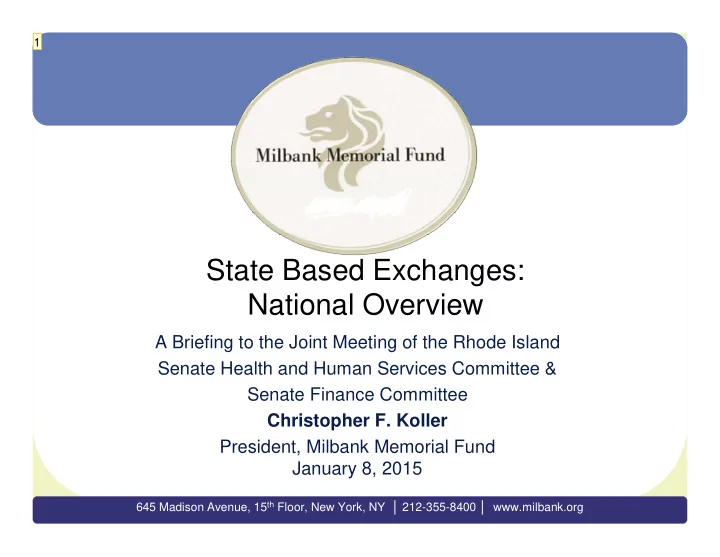

1 State Based Exchanges: National Overview A Briefing to the Joint Meeting of the Rhode Island Senate Health and Human Services Committee & Senate Finance Committee Christopher F. Koller President, Milbank Memorial Fund January 8, 2015 645 Madison Avenue, 15 th Floor, New York, NY │ 212-355-8400 │ www.milbank.org
Slide 1 1 Chris Koller, 11/25/2014
Agenda • Review Exchange Functions • Review RI Decision • Study of State Based Exchanges – Operations – Market Size – Performance – Budget – Financing • Findings • Options for RI │ Slide 2 1/9/2015
1. Exchange Functions Set Forth by Federal Government 1. Certify qualified health plans “Plan Management” 2. Assign a rating to each qualified health plan (gold, silver...) (Making a Market) 1. Provide a website with easy to understand comparisons of plans 2. Present a standardized format for health plan options 3. Provide online calculator for cost of coverage including tax credits 4. Grant “unaffordable” exemptions from the individual mandate Transfer to Treasury a list of people who: • are exempt from the 5. individual mandate • Have access to employer-based coverage but qualified for subsidized coverage Enrollment and 6. Provide employers with the names of employees who terminate coverage during a plan year Eligibility System 1. Establish the Navigator program 2. Provide a toll-free telephone hotline (and enroll individuals in insurance with/without subsidy) Consumer 3. Inform individuals of eligibility requirements for Medicaid and other support State programs and enroll people who are eligible │ Slide 3 1/9/2015
2. Why did RI go With a State Based Exchange (SBE)? Vision of RI Exchange “The Rhode Island Health Benefits Exchange (Exchange) will provide a robust marketplace for all Rhode Islanders to identify health insurance coverage options and for those eligible to purchase coverage.” Source: RI Health Reform Commission/ RI Exchange Planning Process 2011 │ Slide 4 1/9/2015
What does that vision look like? │ Slide 5 1/9/2015
3. What Did Other States Decide? │ Slide 6 1/9/2015
SBE Operations • Of the Sixteen SBE’s, after first year: – None share operational staff for plan management, consumer support or administration. – Four adopted somebody else’s Enrollment/Eligibility Platform • OR (after internal failure), NM and NV use Federal System • MD adopted CT IT services (after internal failure) │ Slide 7 1/9/2015
SBE’s – Operational Results Individual Market Source: Kaiser Family Foundation │ Slide 8 1/9/2015
SBE’s – Operational Results Small Business Health Options (SHOP) Market Source: Kaiser Family Foundation │ Slide 9 1/9/2015
SBE’s – Operational Results New Medicaid Enrollment Source: Kaiser Family Foundation │ Slide 10 1/9/2015
SBE - Finances Sources: KFF, On line documents, Commonwealth Fund Blog by Dash, Lucia et al │ Slide 11 1/9/2015
Findings from Other SBE’s 1. RI operational performance is good 2. Operations – Nobody is sharing services – No SBE has reverted to Feds – those with IT problems looked to Feds (OR) or elsewhere (MD). 3. Finances – Size matters: there are significant economies of scale, driven by IT build and maintenance. • Except for DC, smaller markets (VT, NM, HI, RI) are the last to decide │ Slide 12 1/9/2015
If RI were to throw in the towel on its SBE • Results in fundamentally different vision for health insurance market in RI. • Costs: Feds charge 3.5% of all Exchange-based premiums – Considerably less than anticipated RI Exchange Budget • However: – Accountability for Federal Funds used? – Extracting from Medicaid operations – call volume of people enrolled in Medicaid through Exchange’s front door. – King v Burwell decision could rule no subsidies on Federal Exchange │ Slide 13 1/9/2015
Options for RI Exchange Sustainability 1. Handing all operations back to Feds – Change in health insurance strategy in RI. – Operationally complex – Entails risks (fed negotiations; King v Burwell) 2. Reduce the numerator: Expenses – Benchmarks are emerging – Reduce to core: IT and consumer support • Marketing, analytics, planning, communications etc. – Shared services can achieve cost reductions if • Enrollment and eligibility policies and operations for Exchange and Medicaid are standardized with partners • Staff savings are identified │ Slide 14 1/9/2015
Options for RI Exchange Sustainability II 3. Expand your denominator (People in Exchange) Choice of channels is not costless. – Outside Exchange individual market: 11k currently directly enrolled in BCBS – Outside Exchange small group market : 86 k enrolled in three carriers. • This policy adopted in DC and VT 4. Expand your assessment base and lower the rate – Argument to be made that all employers (large, small and self insured) benefit significantly from Exchange operations • part time employees who enroll in Exchange with federal subsidies or in RIteCare • Adopted in DC • Other market wide assessments for public goods exist (immunizations; HIT) │ Slide 15 1/9/2015
The Vision is still valid │ Slide 16 1/9/2015
Thank you │ Slide 17 1/9/2015
Recommend
More recommend